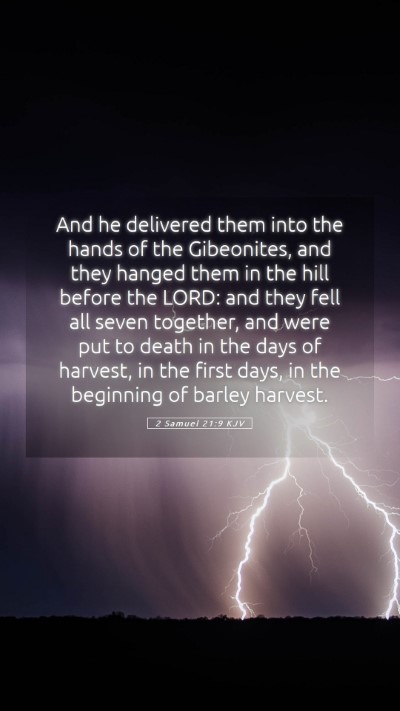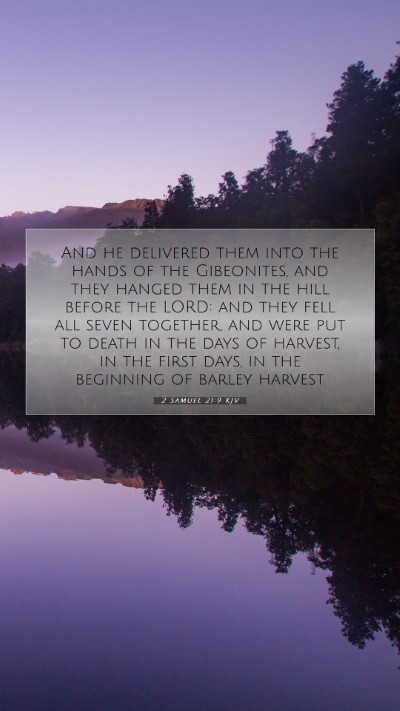Bible Verse Meaning and Commentary: 2 Samuel 21:9
Bible Verse: 2 Samuel 21:9 - "And he delivered them into the hands of the Gibeonites: and they hanged them in the hill before the LORD: and they fell all seven together; and were put to death in the days of harvest, in the first days, in the beginning of barley harvest."
Understanding 2 Samuel 21:9
This verse narrates a grim episode in David's reign, reflecting intricate social and moral dynamics in ancient Israel. It is essential to understand its context and implications through the lenses of various public domain commentaries.
Historical Context
The events taking place in 2 Samuel 21 occur after a three-year famine in Israel, which David understands to be a divine punishment due to Saul’s earlier actions against the Gibeonites. This situation reflects the serious obligation of Israel to uphold covenants made, even those arranged by previous kings.
Interpretations from Commentaries
- Matthew Henry's Commentary: Henry emphasizes the moral obligations present in this narrative. He interprets the hanging of the seven sons as a means of atonement. The Gibeonites, being wronged historically by Saul, demand justice, and David, acting as a divinely appointed leader, acknowledges the need for reparation.
- Albert Barnes' Notes: Barnes points out the significance of the harvest time in this verse. He notes that the timing of the executions, coinciding with the commencement of barley harvest, holds symbolic weight. It serves to underline the gravity of divine retribution impacting not just individuals but the nation as a whole.
- Adam Clarke's Commentary: Clarke focuses on the importance of the Gibeonites' covenant with Israel. He explains that their demand for vengeance highlights the seriousness of treaties and covenants in biblical times and the importance of fulfilling one's obligations to avoid divine displeasure.
Biblical Exegesis
Exegesis of 2 Samuel 21:9 reveals layers of meaning. This passage is not merely historical but invites deeper reflection on justice, honor, and the consequences of sin.
Key Themes Include:
- Covenant Loyalty: The need to honor agreements made, regardless of the actors involved.
- Divine Justice: The role of God in societal affairs and the consequences of collective wrongdoing.
- Moral Complexity: The ambiguous nature of human actions in light of divine commandments.
Application to Daily Life
Understanding this scripture calls for a reflection on our own commitments and responsibilities. Just as David faced the repercussions of Saul's actions, we are reminded that our choices affect not just ourselves but our broader communities.
Through this understanding, one may apply the following insights:
- Assess the weight of promises made in personal relationships and communities.
- Consider the legacy of past actions in influencing current circumstances.
- Recognize the importance of seeking reconciliation and justice in interpersonal conflicts.
Cross References
- Joshua 9:15 - The covenant made with the Gibeonites.
- 2 Samuel 21:1-2 - The context of the famine and Saul’s actions.
- Deuteronomy 21:22-23 - Regulations regarding executions and justice.
Conclusion
In exploring the meaning of 2 Samuel 21:9, we find a rich tapestry of historical reality, moral obligation, and spiritual insight. This verse serves as a reminder of the seriousness with which we must approach our commitments to one another and to God. Through careful study and reflection, we gain profound insights into the nature of justice and the importance of upholding agreements as part of our faith journey.
This examination of biblical text serves not just as a historical account, but as an invitation to engage deeply with the word of God, apply its principles in our lives, and foster discussions in Bible study groups or online Bible study resources.


